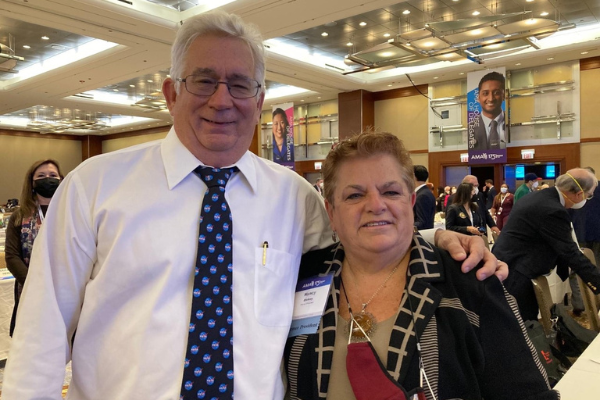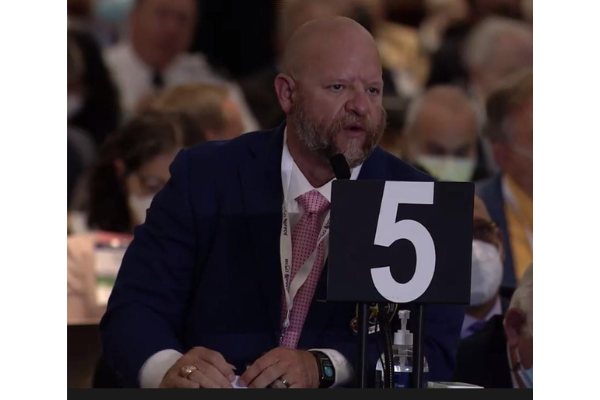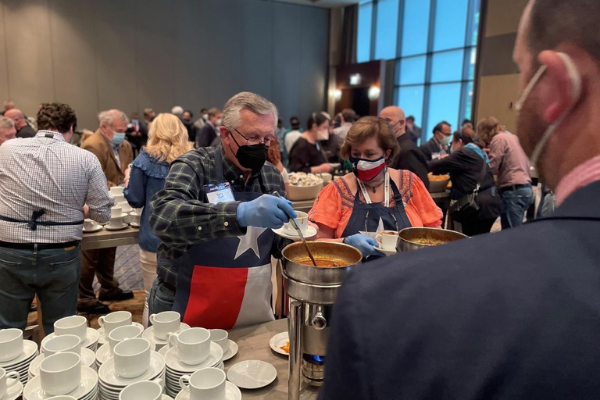Even the 80-mile-an-hour gusts that hit the Windy City that week could not upend the months of preparation the Texas physicians put in to influence numerous national policy areas and win adoption of several Texas proposals. (The meeting carried on safely despite the tornado.)
And yes, fun was had too at the first in-person meeting of the AMA house in three years.
Here are the Texas highlights:
1. Strong Texas leadership

Joining roughly 1,200 physician delegates and alternates from around the country, Texas physicians once again were led successfully by Texas Delegation Chair David N. Henkes, MD (pictured above, left), alongside Texas Medical Association physicians active in several AMA leadership positions.
“During the past two years, virtual meetings were able to handle some of the most emergent issues, but this meeting was important to be able to discuss and deliberate in person some of the held-over lingering issues and reports,” Dr. Henkes said.
Little Elm internist John Flores, MD, chaired the Reference Committee on Legislation.
Houston obstetrician-gynecologist Brandi Ring, MD, chaired the Reference Committee on Medical Practice.
Houston anesthesiologist Sherif Zaafran, MD, served as a member of the Reference Committee on Public Health.
Sugar Land internist Elizabeth Torres, MD, served as a member of the Reference Committee on Science and Technology.
Tyler OB-gyn Yasser Zeid, MD, helped tally election votes in his role as a teller.
Tyler anesthesiologist Asa Lockhart, MD, chaired the Council on Medical Service, his last year in the role.
Dallas public health specialist John Carlo, MD, served on the Council on Science and Public Health.
Lubbock critical care specialist Cynthia Jumper, MD, served on the Council on Medical Education.
Fort Worth pediatrician and TMA President Gary Floyd, MD, was promoted to vice chair of AMA’s Council on Legislation.
Houston facial plastic and reconstructive surgeon Russ Kridel, MD, completed his term as chair of the AMA Board of Trustees. He was elected as a member of the panel in 2014. And despite their election losses, Dr. Kridel and San Antonio radiologist Zeke Silva, MD, ran strong campaigns for AMA president-elect and the Council on Medical Service, respectively.
Fort Worth allergist and immunologist Sue Bailey, MD, finished her term as AMA immediate past president. Check out this Inspiring Women podcast episode celebrating her 40 years of service to organized medicine, including as TMA president in 2010-11.
3. New faces

The first in-person meeting of the AMA house in three years was also one filled with firsts for a handful of delegates, like newly elected alternate delegate Vivek Rao, MD (pictured above, second from right). “It is truly an honor and privilege to be part of such an incredible group of passionate, generous, knowledgeable individuals,” he said. “I have learned so much already.” The Odessa allergist starts his first full term in 2023. And this being Resident and Fellow Section member Matt McGlennon, DO’s first live meeting, he said, “It was awesome to see everyone in person, to be able to help shape the ideal vision of medicine in both the U.S. and Texas.”
4. Texas scope, prior auth, COVID resolutions adopted
Recognizing the progress Texas has made against health plans’ prior authorization practices, delegates adopted a Texas resolution directing AMA to “advocate for implementation of a federal version of a prior authorization ‘gold card’ law, which aims to curb onerous prior authorization practices by many state-regulated health insurers and health maintenance organizations.”
“Many states and organizations applauded Texas leadership on the passage of this state legislation and were interested in enacting this law in their states,” Dr. Henkes said.
Other Texas proposals adopted or incorporated into AMA policy call for:
Fair compensation for administrative burdens related to the prior authorization process, appeals, or denials.
Debt relief or loan forgiveness for physician practices facing COVID-related financial jeopardy.
Engagement with academic institutions across the nation that train non-physicians in health care careers to clarify use of the terms “residency” and “fellowship,” to reduce public confusion.
5. Strong stance on scope

In light of a recent study by Hattiesburg Clinic in Mississippi that showed poorer performance among advanced practice registered nurses and physician assistants, the Texas delegation threw its support behind a resolution the AMA house adopted to encourage and support studies to determine the cost and quality impact of unsupervised nonphysician practice in the U.S.
“The attack on our profession and level of education is now stronger than ever, all at the ultimate cost to our patients. While we as physicians support and value a physician-led team model, midlevel practitioners have not received the training and education that we have,” Beaumont anesthesiologist Ray Callas, MD (pictured above), testified on behalf of the Texas delegation. He is chair of the TMA Board of Trustees and a past chair of TMA’s Council on Legislation.
6. Texas’ Uvalde response gets ovation
Among the moving testimony calling for further action against gun violence, Dr. Callas also testified on behalf of the Texas delegation in support of a measure asking AMA to convene a multistakeholder task force on the issue. To a roomful of applause, he highlighted the action TMA already has taken by forming its own Mental Health Rapid Response Team, a coalition of 20 organizations ranging from state medical specialty societies, statewide leaders from community health centers, and social work and psychology organizations to state government resource leaders.
Although delegates referred the resolution to the AMA board with a report back in 2023, Bobby Mukkamala, MD, immediate past board chair, responded on the house floor by saying: “Your board hears you on this issue. What we have done is not enough, but we will get to work to do more.”
7. AMA items boost TMA advocacy
The house did adopt numerous other policies that come on the heels of TMA advocacy on similar issues by voting to:
Call on the Food and Drug Administration to take prompt action to alleviate current national shortages of lidocaine, normal saline preparations, and iodinated contrast media.
In light of the national baby formula shortage, encourage the practice of breast-milk sharing, and work with appropriate stakeholders to develop standards that promote safe and equitable access.
Work to convene a federally sponsored blue ribbon panel and develop a widely disseminated report on mental health treatment availability and suicide prevention.
Address physician burnout by working with federal agencies and accrediting bodies on system-wide interventions.
All told, about 100 physicians, residents, and medical students representing TMA, various sections, and national specialty societies participated in the AMA meeting.
9. Texas chili party a hit

Drawing an attendance of more than 600 this year, Texas’ annual chili event always creates an opportunity for the delegation to interact and build relationships with colleagues from around the country.
“We are also able to show others a little Texas hospitality and culture,” Dr. Henkes said. “This is one of the most anticipated receptions of the meeting with great attendance.”
The 2022 Interim Meeting of the AMA House of Delegates is scheduled for Nov. 11-15 in Honolulu. Cowboy boots optional.
Correction: This story has been updated to correct that Vivek Rao, MD, appears second from right in the third photo on the page.
Amy Lynn Sorrel
Associate Vice President, Editorial Strategy & Programming
Division of Communications and Marketing
(512) 370-1384